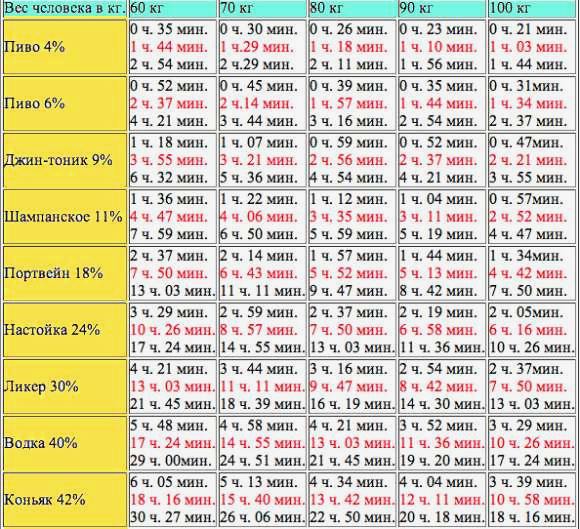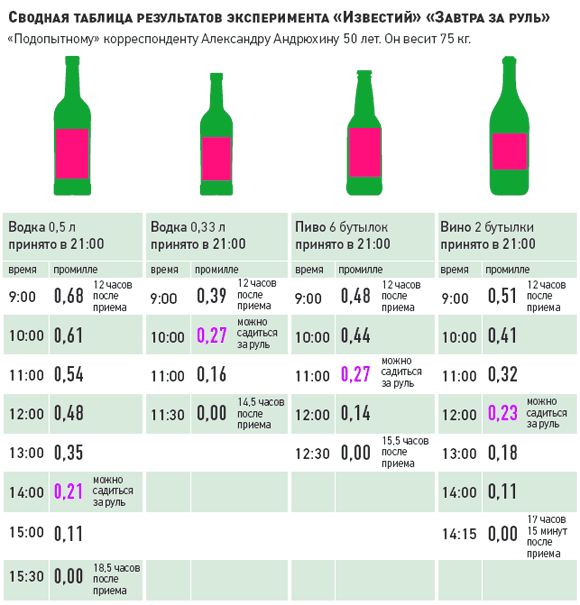
Alcohol, when it enters the human body, starts to destroy it quite quickly. The primary impact is on the brain and liver, the two organs that are most rapidly destroyed. Therefore, many people are seriously interested in whether it is possible to accelerate the withdrawal of alcohol from the body and how it can be done.
Alcohol withdrawal time

Probably, any person who at least once in his life has got over alcohol, knows perfectly well what is alcohol intoxication. In this condition, reaction and coordination of movements deteriorate significantly. Many decisions made in such a state simply cannot be the decisions of a reasonable person. Of course, time spent under the influence of alcohol is not at all forgotten - most people forget about everything that happened. In addition, the person can hardly control himself, losing many human qualities.
And this continues as long as alcohol remains in the human body. Over time, the amount decreases, and people regain their normal abilities. It is understandable that many people are interested in how long it takes to remove alcohol from the blood. In general, it is believed that these calculations can be made according to the following formula: between 90 and 130 milligrams of alcohol per kilogram of live weight is destroyed in one hour. However, women are known to be less resistant to alcohol. Therefore, the withdrawal of alcohol from their body lasts noticeably longer - as a rule, they need 20 percent more time to get rid of a portion of alcohol than a man.
In addition, there is more than one table of alcohol output on the Internet. Many take into account the sex, weight of a person, the amount of alcohol consumed and its strength. Also, it is easy to find calculators that allow you to relatively accurately calculate the time of withdrawal of alcohol from the body. But they, too, should not be fully trusted - above all, the impact of alcohol on the body depends on genetic susceptibility and heredity.

Table of the time of withdrawal of alcohol from blood

Blood alcohol elimination time table
How to accelerate the withdrawal of alcohol from the body

Often there are circumstances in which a drunk person needs to somehow increase the speed of withdrawal of alcohol from the body. The circumstances for this may vary widely. However, the result is one - the person quickly needs to regain his usual abilities. This includes coordination of movements, reaction, memory, intelligence and other abilities that a person is deprived of while intoxicated.
Of course, it's best to go to the hospital. Narcologists can easily provide the patient with an intravenous drip with the appropriate solutions - glucose, brine, and other solutions that allow the body to cope with the poison that has entered the blood faster. In this case, the withdrawal time of alcohol is significantly reduced - usually 4-8 hours.
There are also traditional methods that allow for the rapid withdrawal of alcohol from the body. First of all, you need to drink a lot of water. It will also be useful to drink orange or grapefruit juice - they contain a large amount of fructose, allowing you to stimulate the withdrawal of alcohol from the body.
 It is generally useful to eat any foods containing vitamin C. It can be ascorbic acid, lemon, juices and many others. In addition, activated charcoal - 6-8 pieces in one session, two-three times a day will not hurt.
It is generally useful to eat any foods containing vitamin C. It can be ascorbic acid, lemon, juices and many others. In addition, activated charcoal - 6-8 pieces in one session, two-three times a day will not hurt.
If possible, take a bath or sauna. Stimulating the sweat makes it easier to get rid of the poison that has entered the blood. If the sauna or bath is not available, you can just drink a very hot sweet tea with lemon and climb under the warmest blanket to sweat quickly and efficiently. This will also reduce the time it takes to remove alcohol.
It will also be useful to make a small bit of space. In this case, the human body is kneaded and begins to function much faster. It is quite understandable that at the same time the alcohol withdrawal time is noticeably reduced.
Is the harm of alcohol neutralized if the withdrawal of alcohol from the body is completed?

Many people, having drunk on the eve of alcohol, in the morning torment with only one thought - how to accelerate the withdrawal of alcohol? On the one hand, this is quite understandable - getting rid of drugs, which includes alcohol (and alcohol is a drug, as reported in GOST 5964-82), is accompanied by very painful feelings. It is clear that the body was seriously damaged by the impact of the poison and is now trying to signal its owner about the harm that was done to him, trying to warn against repetition. Therefore, any alcoholic, including "cultural" drinker, who consumes "in moderation" and "on holidays" is interested in how to conduct a complete withdrawal of alcohol.
But the first thing to worry about is not how to get rid of the pain as soon as possible. Yet this pain is only a consequence of truly terrible destruction that has occurred in the body. These are the devastations worth worrying about.
After all, even when alcohol is completely removed from the body, its harm will certainly not be neutralized. And the harm caused by alcohol is truly terrible. It is enough to remind that regular consumption of alcohol in small quantities reduces a person's life for a period of 5 to 20 years. That is, a person who can live 70 years by drinking two shots of vodka, two glasses of wine, or a bottle of beer every day will lose, on average, 13-17 years of life. Consequently, he will die between the ages of 53 and 57. Of course, before he dies, he suffers from a variety of diseases (for example, alcoholic hepatitis), about which the teetotaler at his age will not hear.
 It should be noted that the consumption of alcohol inflicts a terrible blow to the human brain and his liver. It is these organs that are not accidentally damaged in the first place. The liver tries to neutralize the venom in the blood by taking a beating. As a result, a seemingly "moderately drunk" person ends up in a grave at the age of 45-50, and sometimes much earlier. Well, the brain is just the most complex and subtle structure in the human body. It is quite understandable that he is the one who suffers the most from the circulation of alcohol in the blood. To study this material in more detail, it is enough to drive in any search engine the "grape cluster effect" and learn about the impact of alcohol on the brain.
It should be noted that the consumption of alcohol inflicts a terrible blow to the human brain and his liver. It is these organs that are not accidentally damaged in the first place. The liver tries to neutralize the venom in the blood by taking a beating. As a result, a seemingly "moderately drunk" person ends up in a grave at the age of 45-50, and sometimes much earlier. Well, the brain is just the most complex and subtle structure in the human body. It is quite understandable that he is the one who suffers the most from the circulation of alcohol in the blood. To study this material in more detail, it is enough to drive in any search engine the "grape cluster effect" and learn about the impact of alcohol on the brain.
Thus, withdrawal of alcohol should not be the main problem of a "moderate drinker" after drinking. If the effect is relatively easy to eliminate, then the consequences are almost impossible to get rid of.
In general - just think. Is it worth drinking alcohol to suffer from pain and think about only one thing - how to get rid of pain?
Or should we choose a long, happy and healthy life, the birth of healthy and smart children? After all, every drink today significantly reduces the chances of getting all this in the future. So seriously consider - is it worth the present and very doubtful pleasure to give up all your life for it? There is so much interesting, exciting and exciting in the world! So is it not better to get rid of an alcohol poisoning that leads to serious diseases in order to choose a healthy, exciting and long life?
- / z pages
- Home
- Smoking
- Alcohol disorders and their treatment
- Alcohol addiction
- Early and advanced symptoms of alcoholism
- Degrees and signs of alcohol intoxication
- Table of alcohol withdrawal from the body
- Violent drunkenness alone
- Bukhi people
- Binge drinking
- Alkash crying in a waistcoat
- Female Ritual of Rage
